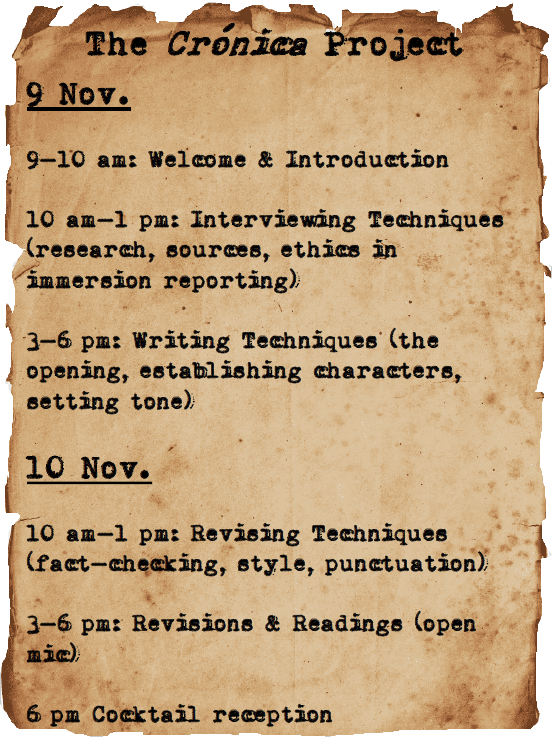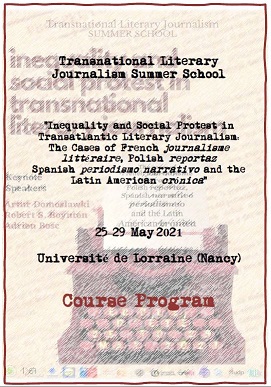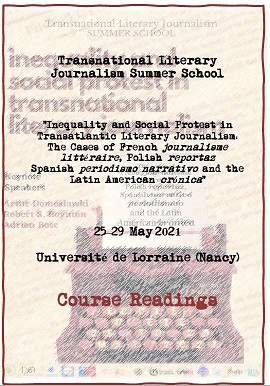Program > Course Program
** New!! **
Creative Nonfiction Writing Workshop
9 - 10 November 2022
Université de Lorraine, Nancy (France)

Originally planned as part of the 1st Transnational Literary Journalism Ecole d'été back in May 2021 (but cancelled due to the Covid pandemic), the CRONICA research team is happy to announce a two-day nonfiction writing workshop to be held in person (Nancy campus, room A104) and online (for those who cannot be present in France). The workshop is meant to introduce new students of all ages and disciplines to writing literary journalism and to advise seasoned literary journalists on one of their recent projects. All are welcome to join us in Nancy or online!
Link for 9 Nov.: click here
Link for 10 Nov.: click here
************************************************************************************
Course Program (online and in-person)
Click on the links below
Program in PDF
Modules' Readings in PDF
Summer School Publicity Flyer
 
Instructors:
- John S. Bak, PR, Université de Lorraine, IDEA (UR 2338)
- Patricia Poblete Alday, PR, Universidad Academia de Humanismo Cristiano
- Roberto Miguel Herrscher, MCF, Universidad Alberto Hurtado
- Marcela Aguilar, PR, Universidad Diego Portales
- Audrey Alvès, MCF, Université de Lorraine, CREM (UR 3476)
- Anna Saignes, MCF HDR, Université de Grenoble Alpes, LITT&ARTS (UMR 5316)
- Aleksandra Wiktorowska, postdoc, Université de Lorraine, IDEA (UR 2338), and the Centre for French Culture and Francophone Studies, University of Warsaw
- Antonio Cuartero Naranjo, postdoc, Universidad de Málaga
- Loïc Ballarini, MCF, Université de Lorraine, CREM (UR 3476)
Professional Guest Speakers:
Artur Domosławski, Polish grand reporter: Polityka
(https://www.polityka.pl/TygodnikPolityka)
Adrien Bosc, editor: Revue Feuilleton
(http://www.editions-du-sous-sol.com/feuilleton/)
Robert S. Boynton, writer, editor and director of “Literary Reportage,” NYU
(https://journalism.nyu.edu/graduate/programs/literary-reportage/faculty/)
Course Content Modules:
Individual modules are intended to teach students via lectures and workshops, with specific reading assignments of the history and the function of journalisme littéraire, reportage and the crónica per the seven different themes. A group project is required by the end of the week-long course.
Course Themes
Module 1: Cultural Studies, Literary Journalism and Social Protest
Directors: John S. Bak & Aleksandra Wiktorowska (Languages: English, Español, Français, Polski)
This module will look at how cultural and literary studies have reshaped literary journalism in France and Spain over the past century. Looking specifically at examples of social protest in France through the gilets jaunes movement and in Spain at the recent Catalan crisis of independence, the module will explore ways in which both countries have used literary journalism in varying ways to cover and critique certain aspects of both protest movements. A comparative study with the recent protests in Chile will be presented to offer an additional line of inquiry.
Ce module examinera comment les études culturelles et littéraires ont transformé le journalisme littéraire en France et en Espagne au cours du dernier siècle. En examinant spécifiquement des exemples de manifestations sociales en France à travers le mouvement gilets jaunes et en Espagne lors de la récente crise d’indépendance catalane, le module explorera les manières dont les deux pays ont utilisé le journalisme littéraire de différentes manières pour couvrir et critiquer certains aspects des deux mouvements. Une étude comparative avec les récentes manifestations au Chili sera présentée pour offrir une piste d’enquête supplémentaire.
Este módulo presta especial atención a la forma como los estudios culturales y literarios han remodelado el periodismo narrativo en Francia y en España durante el último siglo. Analizando los reportajes literarios sobre las protestas sociales (en Francia: el movimiento de chalecos amarillos; en España: la reciente crisis en Cataluña), el módulo explora diferentes maneras en las cuales ambos países usan el periodismo narrativo para mostrar y/o criticar los aspectos particulares de ambos movimientos. Un estudio comparativo con la cobertura de las recientes protestas en Chile añadirá otro hilo de la investigación al análisis.
Module 2: The Latin American Use of Irony and Humor in Crónicas about Social and Political Tragedies
Director: Roberto Herrscher (Languages: English, Español)
This module explores the place of humor in the Latin American crónica. Despite its many coup d’états over the years – and the deaths, kidnappings and crimes linked to them – Latin America is still very much a continent of humor, irony and sarcasm. Laughing and crying through laughter is, in fact, one common trait of Latin America’s new new journalism. We will explore the narrative journalism of Gabriel García Márquez, Roberto Arlt, Elena Poniatowska, Leila Guerriero, Pedro Lemebel and others, and try our hand at designing our own humoristic narrative piece, like García Márquez’s famous “Jirafas” (Giraffe) columns from the 1950s.
Este módulo explora el lugar del humor en el Nuevo nuevo periodismo latinoamericano. Reír y llorar de risa en la crónica de México y Sudamérica. Después y en medio del llano, de lo serio y lo dramático, las muertes y los crímenes, Latinoamérica es también y en gran medida un continente donde reina el humor, la diversión, la ironía y el sarcasmo. Vamos a exporar el periodismo narrativo de Gabriel García Márquez, Roberto Arlt, Elena Poniatowska, Leila Guerriero, Pedro Lemebel y otros, e intentar en el taller pensar y diseñar cada uno una pieza narrativa humorística, en la estela de las famosas “Jirafas” del joven y caribeño García Márquez de los cincuenta.
Module 3: Postmodern Horror Stories: Violence, Immigration and Drug Trafficking in Central America and Mexico
Director: Patricia Poblete Alday (Languages: English, Español)
These three topics are possibly the most common and striking of the Latin American contemporary crónica, especially in the northern cone. This module will focus on two of its highlights: the narrative strategies to report these facts and the ethical reflection (professional and ontological) encouraged by them. Two foundational genres will be used in the comparative analysis: the classical fictional horror story and the journalistic crime report.
Estos tres temas son posiblemente los más comunes y sorprendentes de la crónica contemporánea latinoamericana, especialmente en el cono norte. Este módulo se centrará en dos de sus aspectos más destacados: las estrategias narrativas para informar estos hechos y la reflexión ética (profesional y ontológica) fomentada por ellos. Se utilizarán dos géneros fundamentales en el análisis comparativo: la clásica historia de terror ficticio y el informe periodístico del crimen.
Module 4: Drug Cultures and Social Development in the Southern Cone
Director: Marcela Aguilar (Languages: English, Español)
The return to democracy in 1990 filled Chilean society with hope, not only about an improvement in individual freedom, but also in equality and opportunities in all the fields (education, health, etc). The country, as a whole, is richer now than thirty years ago, but inequality persists and the most fragile groups have little protection. In this context, disappointment in the political and economic systems is apparent, especially among the youth. The work of young crónistas reflects this atmosphere. Their topics include ethnic minorities, economically marginalized groups, and demands for accountability in the daily operations of big companies. The new generation of crónistas uses the narratives procedures to tell stories that emerge from immersive research, where narrative journalism and investigative journalism cross paths.
El regreso a la democracia en 1990 llenó a la sociedad chilena de esperanzas no solo de una mejora en la libertad individual, sino también en la igualdad y las oportunidades en todos los campos (educación, salud, etc.). El país, en general, es más rico ahora que hace 30 años, pero la desigualdad persiste y los grupos más frágiles tienen poca protección. En este contexto, la decepción respecto del sistema político y económico es evidente, especialmente en la juventud. El trabajo de los jóvenes cronistas refleja esta atmósfera. Sus temas son las minorías étnicas, los grupos económicamente marginados, las demandas de responsabilidad en las operaciones diarias de las grandes empresas. La nueva generación de cronistas utiliza los procedimientos narrativos para contar historias que surgen de una investigación profunda. Entonces, el periodismo narrativo es, por lo general, periodismo de investigación también.
Module 5: Mécanismes de la narration journalistique : raconter le monde social
Director: Audrey Alvès & Loïc Ballarini (Languages: Français, English)
Le journalisme narratif ressurgit systématiquement lors de crises ou de changements sociaux importants (selon la perspective historique de J. Hartsock). Raconter le monde social en choisissant le temps long du récit, le souci du détail et de la compréhension plus profonde de l’autre, en priorité celui, qui loin des catégories de vainqueur, de décideur ou de dominant, est d’ordinaire habitué à se taire. Les mécanismes de la narration journalistique activent souvent les mêmes invariants (postures énonciatives singulières, visions satiriques du monde social, dispositifs éthique et poétique…). Ce module propose d’éclairer cette mécanique en analysant une sélection de textes signés par deux figures du journalisme littéraire, issues de l’aire francophone et anglophone : Jean Hatzfeld et Ernest Hemingway. En deuxième temps, le workshop envisagera l’engouement renouvelé et actuel du journalisme narratif en France. Il s’agira, d’une part, d’analyser le phénomène mooks, ces revues-livres qui sont aujourd’hui les espaces privilégiés de publication du grand reportage social et dont la bibliothèque universitaire de Metz développe le fonds documentaire de référence (« Mooks, revues du XXIe siècle »). D’autre part, une ouverture sera proposée en direction des narrations numériques, qui ouvrent de nouvelles possibilités de création, production et diffusion pour le journalisme narratif.
Narrative journalism, which systematically re-emerges during major social crises or changes (according to the historical perspective of John Hartsock), describes the social world in long-form, paying close attention to the details and deeper understanding of the Other, the one always marginalized, never the victor, and frequently silenced. The mechanisms of literary journalistic narration are similar despite the language of origin (singular enunciating postures, satirical visions of the social world, ethical and poetic devices, etc.). This module aims to shed light on these mechanisms by first analyzing the texts of two figures from literary journalism, one from the French and the other from English canon: Jean Hatzfeld and Ernest Hemingway. The second part of the workshop will consider the renewed and current interest in narrative journalism in France. On the one hand, the workshop will analyze the phenomenon of “mooks,” the “book-journals” that are today the privileged spaces for the publication of major social reportage and whose reference collection (“Mooks, Magazines of the 21st century”) is held by the University of Lorraine’s library in Metz. On the other hand, it will initiate discussion on the direction of digital narratives, which open up new possibilities for the creation, production and distribution of narrative journalism.
Module 6: Raconter la misère│Opowieści o nędzy
Director: Anna Saignes (Languages: Français, Polski)
Le reportage social constitue un sous-genre majeur du journalisme littéraire depuis ses origines. Raconter la misère des plus démunis et des exclus est un défi que de nombreux journalistes ont voulu relever pour se constituer en porte-parole des invisibles et des dépourvus de voix. La démarche suscite cependant un certain nombre de questions éthiques qui se combinent à des questions formelles : comment ne pas verser dans le misérabilisme (tel que le définit J.-C. Passeron), comment ne pas réduire le pauvre à son statut de victime incapable de s’en sortir, comment ne pas lui confisquer sa voix, comment éviter la condescendance ? Ce module se propose d’examiner quelques exemples de réponses apportées par des reporters issus de différentes aires culturelles, depuis les années 1920 jusqu’à aujourd’hui. L’aire francophone et polonaise seront privilégiées mais on ne s’interdira pas quelques excursions dans les domaines germanophone et anglophone.
Reportaże społeczne stanowią jedna z głównych odmian gatunkowych reportażu literackiego od początku jego istnienia. Opowiedzenie o ubóstwie i wykluczeniu jest wyzwaniem podejmowanym przez wielu dziennikarzy, którzy stają się w ten sposób rzecznikami słabych, niewidzialnych i pozbawionych głosu. Podejście to rodzi jednak szereg pytań etycznych, łączących się z kwestiami formalnymi: jak nie uczynić z nędzy i nieszczęścia przedmiotu estetycznego, jak uniknąć sprowadzenia ubogich do statusu nieudolnych ofiar, jak nie popaść w protekcjonalność? W ramach warsztatu studenci będą mogli zapoznać się z reportażami stanowiącymi rożne odpowiedzi na podobne pytania. Weźmiemy pod uwagę przede wszystkim reportaże pisane w językach francuskim, polskim, angielskim i niemieckim, od lat 1920 do dzisiaj.
Module 7: The Spain of Sun-drenched Beaches and the Spain of Barren Hinterlands: Economic and Social Inequality in the Distribution of the Population throughout the Country│La España de sol y playa frente a la España vacía: desigualdad económica y social en el reparto de la población
Director: Antonio Cuartero Naranjo (Languages: English, Español)
The current generation of Spanish literary journalism exposes the economic and social inequalities caused by the distribution of the population in Spain. Most of that population is distributed along the Mediterranean and Atlantic coasts (not counting Madrid and Barcelona), with numbers increasing every year. International tourism, with promise of endless “sun and beaches,” had been one of the main factors of this population shift. Various reporters, such as Íñigo Domínguez or Gabi Martínez, have explored the effects of this situation, including urban speculation, the 2008 economic crisis, and the total submission of many towns like Benidorm to tourism. Confronted with this sociological truth, various regions, such as Castilla–La Mancha, Castilla y León and Aragon, have found their population increasingly smaller and more widely dispersed. These citizens have had to overcome multiple adversities in order to preserve minimum public services, such as health care, legal advice, or even compatible transport and network logistics. This situation has been called “Emptying Spain,” and has given rise to different political parties, like “Teruel Exists,” which during the last elections obtained parliamentary representation. Literary journalists such as Sergio del Molino and Virginia Mendoza have worked to reveal the invisibility of this problem and the harsh reality citizens face living in these ever-evolving Spanish hinterlands.
La actual generación de periodistas literarios españoles está dando cuenta de las desigualdades económicas y sociales que provoca el reparto de la población en España. La mayor parte de esta se distribuye en los territorios de la costa mediterránea y atlántica (además de Madrid y Barcelona) que ven cada año aumentar su número. En estos territorios el turismo internacional, que viene buscando “sol y playa” es una de las principales fuentes de ingreso de muchas de estas zonas. Diversos reporteros como Íñigo Domínguez o Gabi Martínez han mostrado los efectos que conlleva esta situación como la especulación urbanística, los efectos de la crisis económica de 2008 o la subordinación total de muchos pueblos al turismo, como por ejemplo Benidorm. Frente a esta situación, diversas zonas del territorio español como Castilla-La Mancha, Castilla y León o Aragón viven una situación totalmente diferente, su población cada vez es menor y se encuentra muy dispersa. Estos ciudadanos se enfrentan a múltiples adversidades para poder obtener los servicios mínimos como una atención sanitaria, atención jurídica o buenas conexiones de transporte o de redes. A esta situación se le ha denominado “La España vacía” e incluso ha nacido diversos partidos políticos, como “Teruel existe” que en la última legislatura obtuvo representación parlamentaria. Diversos autores como Sergio del Molino o Virginia Mendoza han desarrollado extensos trabajos para contar la invisibilidad de este problema y la dura realidad de los ciudadanos que viven en estas zonas.
|



